According to the Cambridge Dictionary, one definition of consistency is, “The state or condition of always happening or behaving in the same way.” That may seem a bit boring at first, but the benefits of consistency can bring just the opposite.
Consistency helps to strengthen connections in the brain, so you may be thinking with greater clarity, and developing skills and knowledge through strong neural pathways.
Consistency creates momentum, which becomes a habit that can contribute to lasting change. So by being consistent you can make big strides in the direction of your goals. It tips the scales toward the side of success.
Consistency in values and principles develop character and reputation. It can create order and predictability, diminishing chaos and disorganization.
The benefits of consistency outweigh any concerns of being boring and redundant. And in fact, it might bring more opportunities for a life full of engaging experiences, success, and confidence.
So, how do you do that?
Create an Environment of Consistency
If you think of being in a place of consistency, you might find it’s a nice place to be. Knowing what to expect can help things go more smoothly.
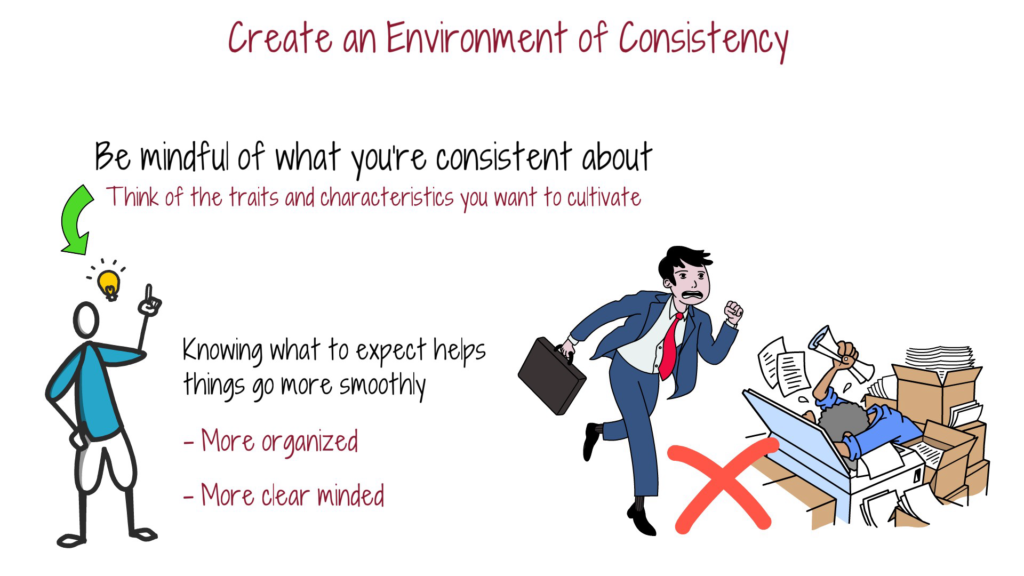
In a state of consistency, you might feel like you’re more organized and clear minded. You could have a better idea of what you’re doing, where you’re going and how to get there.
When developing consistency, it’s important to be mindful of what you’re consistent about.
Being consistently late, irresponsible or negative can obviously bring about an undesirable environment. So when you think of creating your environment of consistency, think of the traits and characteristics you want to cultivate. Consistent positive thoughts and actions can help develop habits that lead to success.
For example, when you arrive at work consistently at the same time, and perform your tasks with your usual standards, it contributes to stability in the workplace. Consistency builds trust, and when people know what to expect from you, it allows teamwork to flow in a positive direction. You may be more productive if the expectations are already established and you can work without first laying out all of the ground rules.
Make it easy to be consistent. If you have a regular morning routine, you can be prepared to move through it with minimal effort. When things are convenient, you will be more likely to do them. By repeatedly following the same set of standards and behaviors you have set for yourself, you can create consistency in all of your tasks and activities.
Another way to make your environment conducive to consistency is to group similar activities together. For example, read, meditate, and relax in one block of time. And do house cleaning and laundry in another. This can make it easier to move from one thing to the next. When you make it a smooth transition you might be more likely to be consistent in doing it.
Goals, Habits, and Routines
The key to success is establishing your goals and sticking with them until they’re realized. So a good place to start building consistency is by thinking about what you want. Goals that mean something to you will have more momentum. Then repeat these behaviors to develop desirable patterns of consistency.
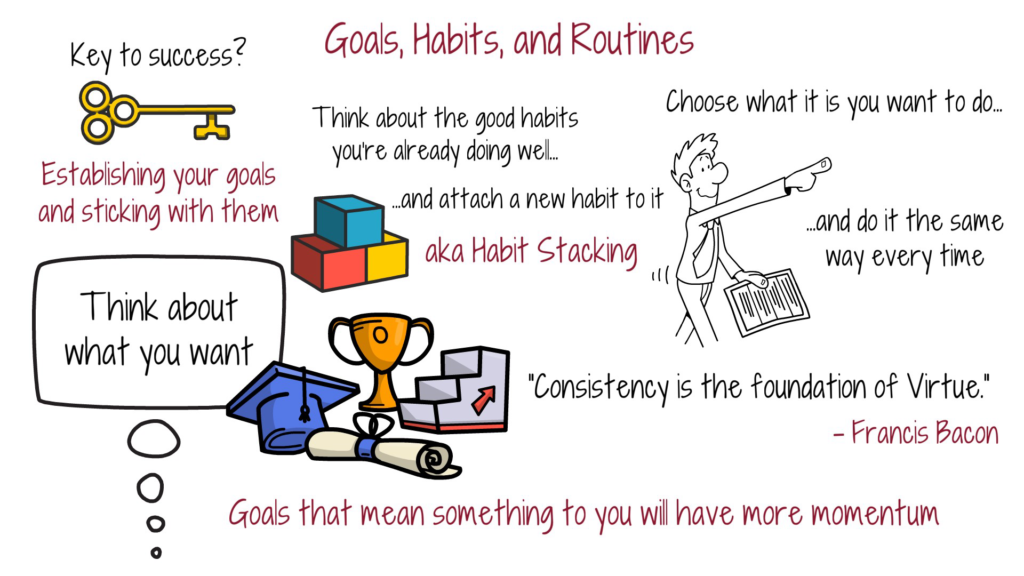
Sir Francis Bacon stated,
“Consistency is the foundation of Virtue.”
By that he meant that when someone does the right thing time and time again, they are able to build on those traits that create a strong character. Choose what it is you want to do, and do it the same way every time. You’ll get better at it by repetition, and it will become a habit.
Start with small steps. For example, think about the good habits you’re already doing well, and attach a new habit to it. This is known as Habit Stacking. When you are doing one thing consistently, it’s easier to add another good habit along with that one, rather than building something new altogether.
Think about it this way, if you have already developed a strong habit of daily exercise, but you also would like to be more consistent in your eating habits, you can tell yourself that after each exercise session, you will have a healthy snack of fruit, vegetables or protein. That way, you can be consistent in eating good food on a regular basis. By being consistent with exercise and a pre planned meal, you may become more consistent in eating foods that support your goal.
By creating routines with repeated actions you develop consistency. When you know what to do next, you may find that your efforts can be easier, smoother and more efficient. If you don’t have to guess at what choice to make, you might think with more clarity and show others that you know what you’re doing.
Overcoming the Obstacles
Even the strongest person can experience procrastination and motivation slumps when trying to be consistent. An old African Proverb says,
“Smooth seas do not make skilled sailors.”
You can expect that obstacles and challenges are going to present themselves, but you might try looking at these obstacles as opportunities. Sometimes the obstacles and challenges are the catalysts that make you better, stronger or smarter.

For example, with the gym scenario, there may be days you just don’t feel like going. Sometimes it can be hard to be consistent. Maybe you’re moving slow, or just can’t feel motivated at all. At these times, you might need a little help to stay consistent.
Try being creative to give yourself a boost. And look at how this might be an opportunity to test your strength and stamina. How could you use it as an opportunity to strengthen your resolve toward consistency?
Solid support systems can be another helpful way to maintain your consistent habits. Having a gym buddy, or someone to call if you need encouragement might help you to stay on track.
Track Your Progress
Staying consistent with your habits can help you reach your goals. Reassess and review your plans often to be sure you are still heading in the right direction.
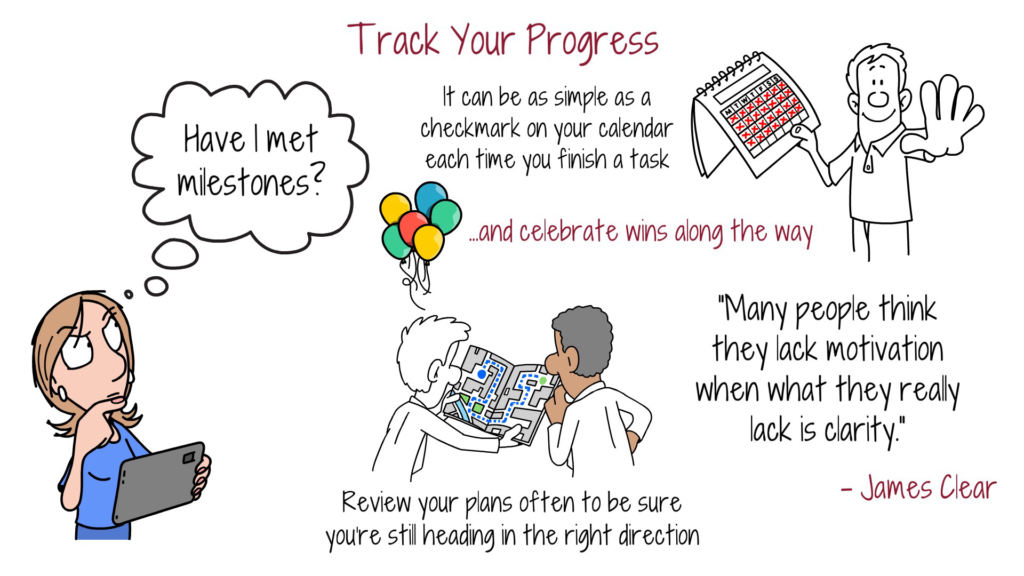
Ask yourself questions to evaluate the consistency of your daily actions. Have I met milestones? Am I on track with my plan? Author James Clear wrote,
“Many people think they lack motivation when what they really lack is clarity.”
Tracking your progress doesn’t have to be complicated. For example, if you’re trying to be consistent in taking a daily walk, you could put a checkmark on your calendar each time you finish your walk. It’s a simple way to keep a record of your activity, and easy to see your progress at a glance.
Remember to celebrate wins along the way. Rewarding yourself for your consistent habits and actions can add momentum.
Stay Resilient
Once you’ve developed good habits and are working consistently toward your goals, you may find there are times when you need to be resilient. Consistency does not mean being rigid.
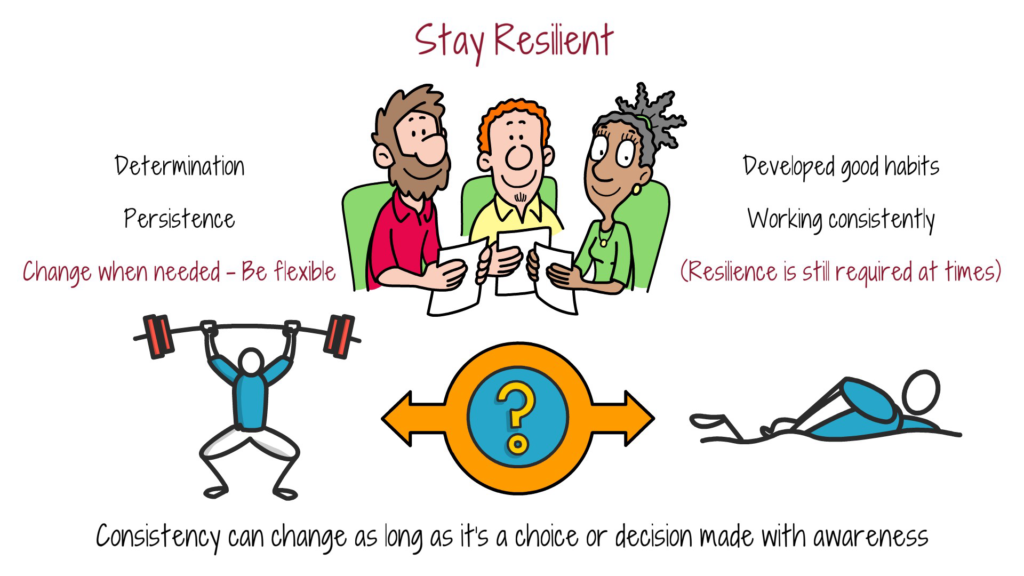
Determination and persistence are useful tools to continue moving forward, but you can change when needed. For example, what if your goals or interests change? Be flexible, and know that it’s okay to make adjustments along the way.
Consistency can change as long as it’s a choice or decision made with awareness. For example, you may be consistent in going to the gym every day, but then decide to try a different sport or activity instead. You can still maintain the consistency of your workouts, but change to a different form, depending on your interests.
Ask yourself, do I still want to do this? Did the circumstances change? Is this still relevant? And act accordingly to form a decision based on the new information. Your character traits of consistent stability and fortitude have not changed. Only the outside activity.
Final Thoughts
When you make consistent choices that support being the person you want to be, you might have an effect on something larger than yourself. The way you interact in the world defines your character, and helps others to understand what they can expect from you.
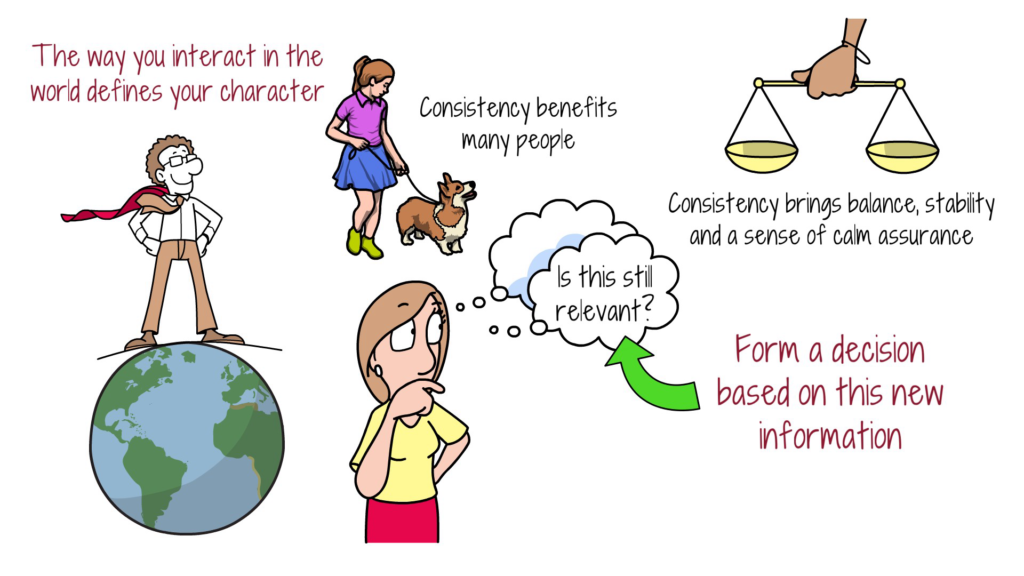
Nearly everyone benefits from consistency. Children and pets are great examples of those who thrive in a consistent environment.
Consistency can bring balance, stability and a sense of calm assurance. By developing solid habits and behaviors with consistency, you might just find more success as you move steadily in the direction of your goals.
